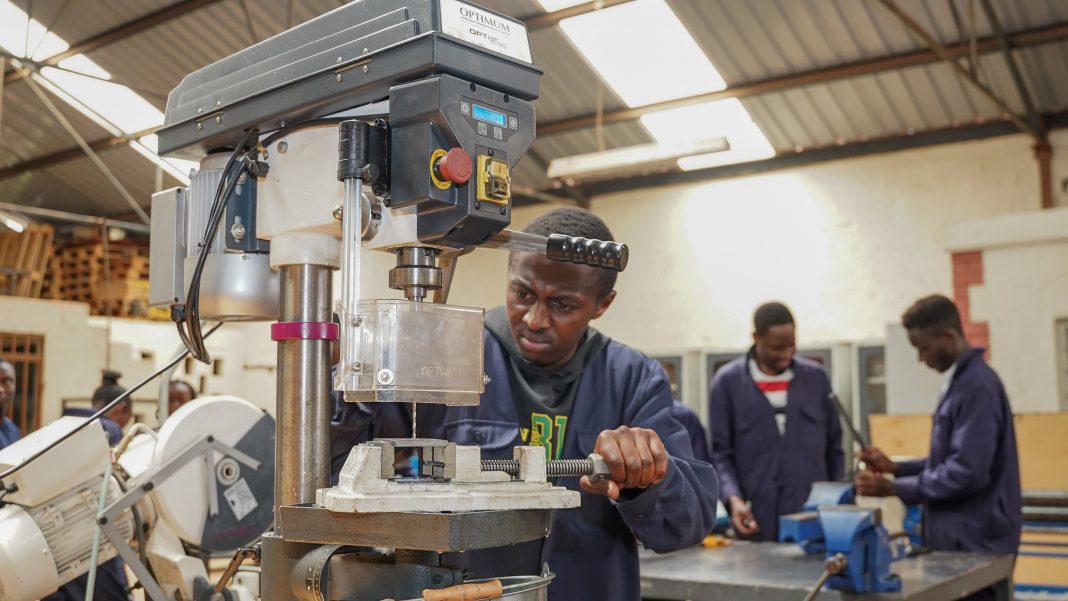By Gift Briton
Public-private partnership between Technical and Vocational Education and Training (TVET) institutes and the private sector is increasing graduate employability in East Africa.
Eight in ten graduates from East African TVET institutes are securing jobs within six months of completing their studies. This improvement is a result of the partnership, which ensures that students are trained in skills that match industry needs.
The partnerships were developed under the World Bank–funded East Africa Skills for Transformation and Regional Integration Project (EASTRIP). Before the project, only one in two graduates found work within six months.
Female employment has also improved significantly. The proportion of women getting jobs after graduation has grown from 51 percent to 74 percent.
The new data were shared during the Africa Skills for Jobs Policy Academy held in Nairobi from 30th September to 3rd October 2025. The event was organised by the World Bank and the Inter-University Council for East Africa (IUCEA).
Dr. Cosam Joseph, EASTRIP Regional Project Coordinator at IUCEA, said the change is driven by stronger industry involvement.
“Our experience has shown that when we align training to the needs of industry, young people get jobs quickly,” he said.
Under EASTRIP, 16 flagship TVET institutes across the three countries have partnered with more than 300 private sector companies. Together, they have developed over 500 new programmes tailored to market needs. These programmes focus on renewable energy, geothermal science, aviation, logistics, manufacturing, and hospitality.
In Kenya, the KenGen Geothermal Training Centre has become a regional hub for geothermal technology. In Tanzania, the National Institute of Transport introduced aviation and logistics courses, with graduates now working in regional airlines. In Ethiopia, General Wingate Polytechnic expanded its training to manufacturing and leather technology, creating new links with local industries.
Eng. Dr. Prosper Mgaya, Rector of the National Institute of Transport in Tanzania, said collaboration with airlines and logistics firms has been key. “Our graduates are being absorbed by industry almost immediately after graduation,” he said.
At the KenGen Geothermal Training Centre, students receive hands-on experience in renewable energy.
“Our training model is industry-based because we are part of KenGen, the electricity generation company in Kenya,” said Risper Kandie, the centre’s leader. “This allows us to prepare specialists who can step directly into critical roles in the energy sector.”
Kandie added that World Bank support has helped the centre evolve. “KenGen Geothermal Training Centre has transformed from an in-house training unit into a fully-fledged TVET institute,” she said.
Enrolment in the 16 flagship institutes has also grown sharply from 6,971 students at the start of the project to 57,857 currently. About 19,000 of these students are women, showing progress in attracting female learners to technical fields traditionally dominated by men.
Zekarias Belayneh, Project and International Relations Coordinator at General Wingate Polytechnic in Ethiopia, said their partnership model has changed outcomes.
“We began with only six programmes. Today we run more than twenty developed with industries. Our graduates are now more attractive to employers, and dropout rates have fallen,” he said.
Employers have also noticed the change. “Our collaboration with TVET institutes in Ethiopia has bridged the gap between training and employment,” said Belachew Alemu, Managing Director of Sheraton Addis.
“We now receive graduates who are industry-ready because they were trained in real production settings using industry-designed curricula.”
Beyond employment, EASTRIP has strengthened regional cooperation. The Regional TVET Qualifications Framework now supports 204 mutually recognised qualifications. This allows graduates to work across Kenya, Tanzania, and Ethiopia without barriers.
“The Regional TVET Qualification Framework allows employers in Tanzania to recruit TVET graduates trained in Kenya or Ethiopia with confidence that their qualifications meet the required standards,” said Dr. Joseph.
Cross-border student movement has also increased. More than 2,000 students have now studied in neighbouring countries, up from only 31 before the project.
Evans Onyango, Head of Research and Innovations at Kisumu National Polytechnic, said these exchanges are building lifelong networks.
“Students from Tanzania and Ethiopia have come to study with Kenyans, share ideas, and create professional links that will last throughout their careers,” he said.







